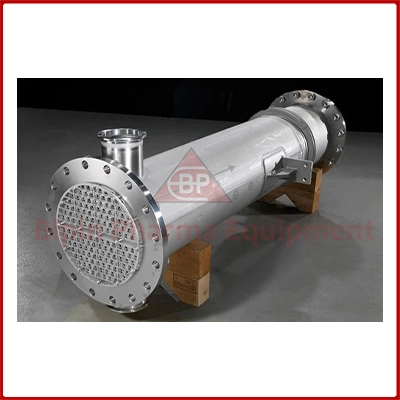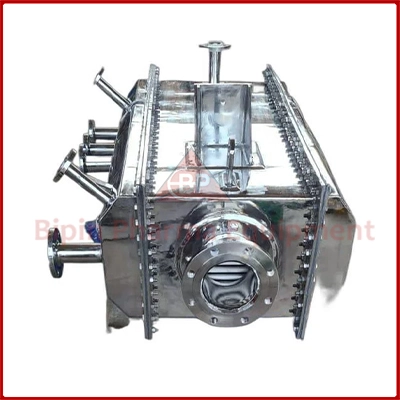Condensers Leading Manufacturer, Supplier, and Exporter in India
Bipin Pharma Equipment is a trusted name in the design, manufacturing, and export of high-quality condensers for various industries, including pharmaceuticals, chemicals, food processing, and more. As a prominent Condenser Manufacturer, Supplier, and Exporter, we are committed to delivering innovative and efficient solutions that meet the specific requirements of our clients.
With a focus on precision engineering, durability, and energy efficiency, our condensers are designed to support a wide range of industrial applications, ensuring optimal performance and reliability.


What is a Condenser?
A Condenser is an essential component used in industrial processes to convert vapors into liquids through the process of condensation. By removing heat from vaporized substances, a condenser facilitates their transformation into liquid form, which is crucial in applications such as distillation, solvent recovery, and reaction cooling.
Available in various designs, including surface condensers, reflux condensers, and air-cooled condensers, these systems cater to the unique demands of industries like pharmaceuticals, chemicals, and food processing.
Key Features of a Condenser
- Efficient Heat Transfer:
Designed to maximize heat exchange between vapor and cooling medium, ensuring rapid and effective condensation. - High Cooling Capacity:
Equipped with advanced cooling surfaces or tubes to enhance contact area, delivering superior cooling performance. - Compact and Space-Saving Design:
Engineered for installations where space constraints are a concern, without compromising efficiency. - Corrosion Resistance:
Constructed from durable, corrosion-resistant materials for extended service life, even in harsh environments. - Versatility:
Available in various configurations to suit a wide range of applications across different industries. - Energy Efficiency:
Designed to optimize energy consumption, reducing operational costs and environmental impact. - Easy Maintenance:
Features accessible components that simplify cleaning and maintenance, minimizing downtime. - Durability:
Built to withstand the demands of industrial operations, ensuring long-term performance and reliability. - Safety Features:
Includes safety mechanisms like pressure relief valves and temperature sensors to ensure secure operation. - Cost-Effective:
Provides an economical solution for heat exchange and condensation processes.
Advantages of Using a Condenser
- Improved Process Efficiency: Ensures optimal cooling and condensation for various industrial processes.
- Enhanced Productivity: Facilitates efficient heat exchange, reducing process times and boosting output.
- Reliable Performance: Durable design ensures consistent operation, even under demanding conditions.
- Reduced Energy Consumption: Energy-efficient systems lower operating costs and support sustainability goals.
- Versatile Applications: Adaptable to multiple industries and process requirements.
Applications of Condensers
- Distillation Processes: Essential for separating and collecting components in distillation applications, including chemical synthesis, petroleum refinement, and essential oil extraction.
- Refrigeration and Air Conditioning: Key components in cooling systems, helping condense refrigerant gases for efficient operation.
- Chemical Processing: Used for solvent recovery, reaction cooling, and product purification, converting vaporized chemicals into liquid form for further processing.
- Chemical Processing: Used for solvent recovery, reaction cooling, and product purification, converting vaporized chemicals into liquid form for further processing.
- Power Plants: Converts steam back into liquid water in power plants, enhancing the efficiency of electricity generation.
- Pharmaceutical Industry: Supports solvent recovery, crystallization, and purification processes in drug manufacturing, ensuring precise temperature control.
- Food and Beverage Industry: Used for cooling and condensation in the production of beverages, flavorings, and other consumables.
- Environmental Testing: Captures and condenses harmful gases and vapors in emissions testing and environmental
Why Choose Bipin Pharma Equipment for Condensers?
- Industry Expertise: Extensive experience in designing and manufacturing reliable, high-performance condensers.
- Customized Solutions: Tailored designs to meet the unique requirements of diverse industrial applications.
- Global Reputation: Trusted by clients across India and internationally for delivering quality and efficiency.
- Energy Efficiency: Machines designed to reduce energy consumption without compromising performance.
- Comprehensive Support: From installation to maintenance, we provide complete assistance for seamless operations.
Bipin Pharma Equipment's Condensers are engineered to deliver precision, reliability, and energy efficiency across various applications. Contact us today to learn more or to request a customized solution for your industrial needs.
